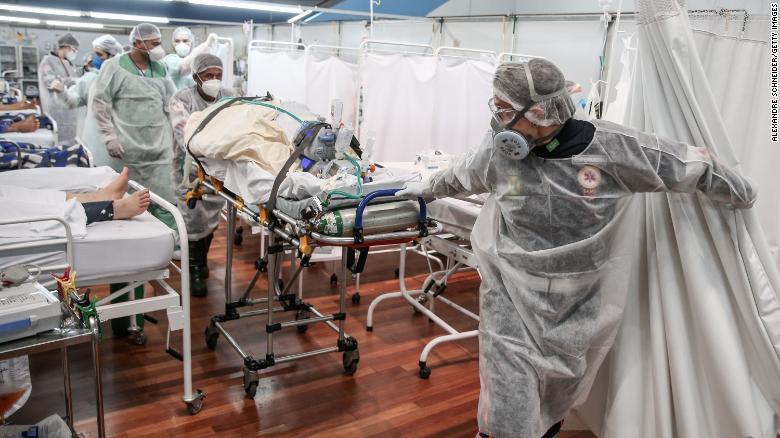begin quote from: Brazil is becoming a global Covid hazard
No vaccines, no leadership, no end in sight. How Brazil became a global threat

Analysis by Matt Rivers, CNN
Updated 12:43 PM ET, Sat March 20, 2021
 00:07/03:15
00:07/03:15Rio de Janeiro, Brazil (CNN)The temperature read 95 degrees Fahrenheit on Tuesday, but the humidity made it feel worse. Amid the stifling late summer Rio de Janeiro heat, Silvia Silva Santos steadied her 77-year-old mother as they walked toward the clinic gate.
"We've already come here twice but she hasn't managed to get a vaccine," said Silva Santos. "She just stands in line and then there's no more vaccines and we have to leave."At the gate, Silva Santos asked the guard if she could get her mother a vaccine. Keenly aware of CNN cameras watching, he quickly ushered her in.About five minutes later, the pair came back out, bad news written on their faces."I think this is very wrong," said Silva Santos, clearly angry and frustrated. "Now we'll have to find out again when they'll have vaccines and you never know when."That frustration rippled through the elderly crowd as person after person was denied a first dose of a vaccine, after the state of Rio de Janeiro suspended its vaccination campaign because it had run out of vaccine supplies."This is a disaster, a total disaster," a woman told CNN after being denied her vaccine. "Who is to blame for all this? I think our leaders, our politicians suck." Medical staff transport a patient on a stretcher at a field hospital as coronavirus cases soar on March 11, 2021 in Santo Andre, Brazil.
Medical staff transport a patient on a stretcher at a field hospital as coronavirus cases soar on March 11, 2021 in Santo Andre, Brazil.The growing perfect storm
The Covid-19 crisis in Brazil has never been worse. Nearly every Brazilian state has an ICU occupancy of 80% or higher, according to a CNN analysis of state data. As of Friday, 16 of 26 states were at or above 90%, meaning those health systems have collapsed or are at imminent risk of doing so.The seven-day averages of both new cases and new deaths are higher than they have ever been.In the last 10 days, about a quarter of all coronavirus deaths worldwide have been recorded in Brazil, according to CNN analysis."They are clear signs that we are in a phase of very critical acceleration of the epidemic and it is unprecedented," said Jesem Orellana, a Brazilian epidemiologist.If vaccines are the ultimate way out from this global pandemic, Brazil has a long way to go to seeing this through.As of Friday, less than 10 million people in the country of about 220 million had received at least one dose, according to federal health data. Only 1.57% of the population had been fully vaccinated.That is the result of a slow rollout program that has been plagued by delays. During the announcement of its distribution plan in early February, the government promised some 46 million vaccine doses to be available in March. It's been repeatedly forced to lower that number, now estimating only 26 million by month's end.In-country production of what the governments says will eventually be hundreds of millions of doses of the Oxford-AstraZeneca vaccine only just got off the ground. The first 500,000 doses were delivered and celebrated by top Ministry of Health officials in Rio de Janeiro this week, despite being months behind schedule."[There are] no vaccines in an amount that would really make an impact right now," said Natalia Pasternak, a Brazilian microbiologist, who said it won't be until well into the second half of the year before enough vaccines are available to make a substantive impact on the epidemic.If vaccines are to remain in short supply for the foreseeable future, the only remaining ways to control the epidemic's exponential growth in Brazil are the methods the world has heard ad nauseam -- social distancing, no large crowds, restricted movements and good hygiene.But in many places throughout Brazil, that is just not happening. In bustling Rio de Janeiro, it is easy to find maskless crowds walking the streets, conversing in close quarters.Though the city's famed beaches are closed this weekend, restaurants and bars can still be open until 9 p.m., many likely to be filled to capacity.Many states have imposed much harsher restrictions including nighttime curfews, but local leaders are fighting against federal leadership, or a lack thereof, determined to keep things open.President Jair Bolsonaro, a Covid-19 skeptic who has mocked the efficacy of vaccines and hasn't publicly taken one himself, announced Thursday that he would be taking legal action against certain states in the country's Supreme Court, claiming the only person who can decree curfews is him -- something he has promised never to do.Despite thousands of people dying from the virus each day, he claims the real threat is from the economic harm virus-prompted restrictions can impose.Millions of his supporters are following his lead, openly flaunting local regulations of social distancing and mask wearing.All of this would be concerning enough on its own, but it is exacerbated by a deeply concerning reality -- the spread of Covid-19 variants.'People don't realize how much worse P.1 is'
The P.1 variant was first discovered in Japan. Health authorities detected the viral mutation in multiple travelers that were returning from Amazonas state, an isolated region in Brazil's north replete with rainforest.CNN reported from the region in late January, where a brutal second wave of Covid-19 was decimating the city of Manaus.Nearly two months later, more and more research points to the P.1 variant as a crucial factor not only in the Manaus outbreak but in the nationwide crisis Brazil faces today.A study from Brazil's top medical research foundation, Fiocruz, from early March found that of eight Brazilian states studied, Covid-19 variants including P.1 were prevalent in at least 50% of new cases.The variant is widely agreed to be more easily transmissible, up to 2.2 times so according to a recent study. That is more transmissible than the widely discussed B.1.1.7 variant first identified in the United Kingdom, which is up to 1.7 times more transmissible, according to a December study.That same study also found that people are 25% to 65% more likely to evade existing protective immunity from previous non-P.1 infections.Finally, there remain concerns the different vaccines might not be as effective against the P.1 variant.Though a recent study from the UK did find that the "existing vaccines may protect against the Brazilian coronavirus variant," CNN spoke to several epidemiologists who remain concerned."The world has not awoken the dire potential reality that P1 variant could represent," said Dr. Eric Feigl-Ding, an epidemiologist. "People don't realize how much worse P1 is."Brazil is becoming a global hazard
Amidst Brazil's unmitigated viral spread lies two additional, distinct threats.One, the easier export of the existing P.1 variant abroad. It's already in at least two dozen countries and counting and international travel to and from Brazil is still open to for most countries.Two, if the P.1 variant was created here, so can others."The pandemic being out of control in Brazil caused the variant," said Pasternak, the Brazilian microbiologist. "And it's going to cause more variants. It's going to cause more mutations because this is what happens when you let the virus replicate freely."Under the laws of viral evolution, new variants are created to try and allow the virus to spread more easily. Along the way, more dangerous iterations can be created."More variants mean that there is a greater probability that one of these variants can really escape all vaccines, for instance," said Pasternak. "It's rare, but it could happen."That, she says, makes Brazil a global hazard, not just to its neighboring countries but to others around the world."All of this together should raise the alarms in every country around the world that we must help Brazil contain P1, lest we all suffer the same fate of the collapsing Brazilian hospital system," said Dr. Feigl-Ding.With a lack of a vaccines and a government unwilling to take the steps necessary to prevent that from happening, it is unclear how things get better in Brazil anytime soon.Journalist Eduardo Duwe contributed to this report.





















No comments:
Post a Comment